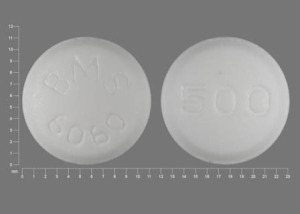Glucophage and Alcohol/Food Interactions
There is 1 alcohol/food/lifestyle interaction with Glucophage (metformin).
Metformin Food/Lifestyle
Major Food Interaction
MetFORMIN should be taken with meals, and excessive alcohol intake (either short-term binge drinking or frequent consumption) should be avoided during treatment. Taking metFORMIN with alcohol may increase the risk of a rare but serious and potentially life-threatening condition known as lactic acidosis, which is a buildup of lactic acid in the blood that can occasionally occur during treatment with metformin-containing products. Lactic acidosis is more likely to occur if you have kidney or liver disease, acute or unstable congestive heart failure, or dehydration. You should seek immediate medical attention if you develop potential signs and symptoms of lactic acidosis such as fatigue, weakness, muscle pain, increasing drowsiness, abdominal pain or discomfort, slow or irregular heartbeat, breathing difficulty, chills, and other unusual symptoms. Alcohol may also affect blood glucose levels in patients with diabetes. Both hypoglycemia (low blood sugar) and hyperglycemia (high blood sugar) may occur, depending on how much and how often you drink. You should avoid using alcohol if your diabetes is not well controlled or if you have high triglycerides, neuropathy (nerve damage), or pancreatitis. Moderate alcohol consumption generally does not affect blood glucose levels if your diabetes is under control. However, you should limit your alcohol intake due to the risk of lactic acidosis with metformin. Avoid drinking alcohol on an empty stomach or following exercise, as it may increase the risk of hypoglycemia. Talk to your doctor or pharmacist if you have any questions or concerns about metformin.
Switch to professional interaction data
Glucophage drug interactions
There are 381 drug interactions with Glucophage (metformin).
Glucophage disease interactions
There are 5 disease interactions with Glucophage (metformin) which include:
More about Glucophage (metformin)
- Glucophage consumer information
- Check interactions
- Compare alternatives
- Reviews (39)
- Drug images
- Latest FDA alerts (18)
- Side effects
- Dosage information
- During pregnancy
- Generic availability
- Support group
- Drug class: non-sulfonylureas
- Breastfeeding
Related treatment guides
Drug Interaction Classification
| Highly clinically significant. Avoid combinations; the risk of the interaction outweighs the benefit. | |
| Moderately clinically significant. Usually avoid combinations; use it only under special circumstances. | |
| Minimally clinically significant. Minimize risk; assess risk and consider an alternative drug, take steps to circumvent the interaction risk and/or institute a monitoring plan. | |
| No interaction information available. |
See also:
Further information
Always consult your healthcare provider to ensure the information displayed on this page applies to your personal circumstances.


